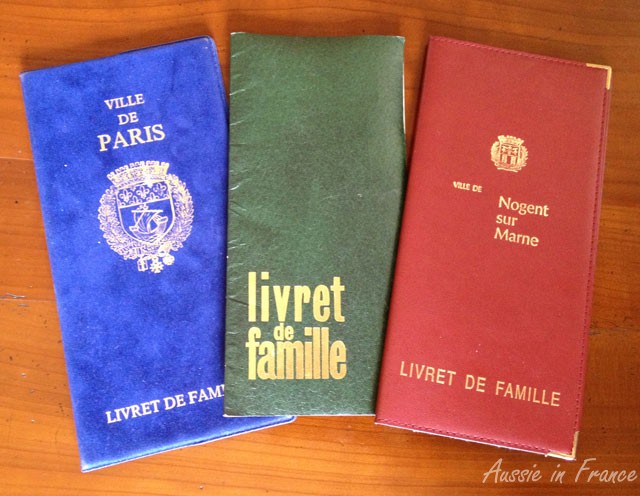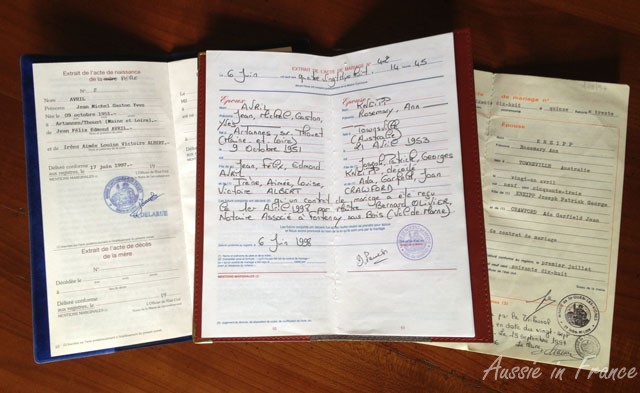When I first got married in France and saw our livret de famille I thought it was very neat although I didn’t realise its importance. It’s a little book in which the details of your marriage are written and which is completed with each child. When you get divorced, your livret is updated as well. If you are not married, you are issued a livret de famille when your first child is born. If you separate or divorce, you get another one.

The first thing I discovered when my children when to school was the fiche d’état civil which was a piece of paper delivered by the town hall containing the information about an individual child taken from the livret. I even needed one when Black Cat started ballet! What a waste of time. What busy mother (or father) wants to go to the town hall and sit around waiting for a civil servant to copy information by hand onto a piece of paper?
At the time, the only ID in Australia was a drivers licence or passport and children certainly didn’t need ID if they stayed within the country! Fortunately, the fiche d’état civil was abandoned in the year 2000 and the carte d’identité became compulsory and free even for children.

So what exactly is a fiche, you might be wondering (état civil = civil status). It’s one of those funny words that has several meanings and no satisfactory translation usually because we don’t often have an equivalent concept.
The fiche d’état civil was a flimsy bit of A4 paper. A fiche can also be made of stiff paper or cardboard such as a fiche-cuisine which is a recipe card. Those cards we used to take notes on and put in a filing box in the old days were called fiches. Index cards, if I remember rightly.
At the doctor’s, you might be asked to fill out a fiche which I guess we would call a form. But there is also the word formulaire. I asked Jean Michel to explain the difference between fiche and formulaire. “Bonne question”, was his typical reply.
Its seems that a fiche is used to contain basic data whereas a formulaire is used to make a request, such as a passport or enrolment formula (fiche d’inscription).
Another popular fiche is the fiche de paie or pay slip which you are supposed to keep for your entire life if you want to get your pension.
A fiche technique is a specification sheet or spec.
A fichier is a set of fiches and therefore a file and that includes computer files which are also fichiers. If you want to be specific, you can say fichier informatique. Although ordinateur means a computer, the word informatique is used in most other contexts: informatique = computer science; il est dans l’informatique = he’s in computers; l’industrie informatique = computer industry. By extension fichier d’adresses is a mailing list.
And to go back to livret, when else do we use the word in French? A livret de caisse d’épargne is a savings bankbook (pretty rare these days), and a livret scolaire is a report book, though I don’t know if they have those any more. Livret can also be used to describe any booklet and even a catalogue for an art show, for example.
An opera libretto is a livret d’opéra.
Perhaps you know other meanings of the word fiche?





Restaurants will often ask me if I want a fiche, which is normally a handwritten receipt with the restaurant’s stamp or printed letterhead on it, with the meal itemised and the tax shown separately. It’s offered for tax purposes (mine), in addition to the cash register printout, which is the ticket.
Yes, that is what they also call the the docket you get in some of the old-fashioned kitchenware stores in Paris. You take your fiche to the cash desk and after you’ve paid, you take it back stamped to get the goods.
That sounds like way too much bureaucracy!
France is really good at bureaucracy.
Dictionnaries list “fiche de courant”. Is this the electrical plug or is it the electrical socket that the plug goes into?
The fiche de courant is the male socket. The female plug is a prise de courant. In Australia, of course, you can call them both plug, which is a little confusing.
I would love to be able to say French bureaucracy doesn’t concern me and so “je m’en fiche” 😉 but unfortunately that is not the case. I read this post with more interest than should ever be accorded to bureaucratic matters because I’ve always wondered about the word fiche and fichier.
But the way, I really love your Friday French posts. They’re great help for my French and for teaching English to French people! Thanks so much!
Hello Kalen and welcome to Aussie in France. An, yes, Je m’en fiche which is actuallyl an attenuated version of the vulgar je m’en fous.
I’m delighted you love my Friday French posts. I certainly enjoy writing them!
Merci